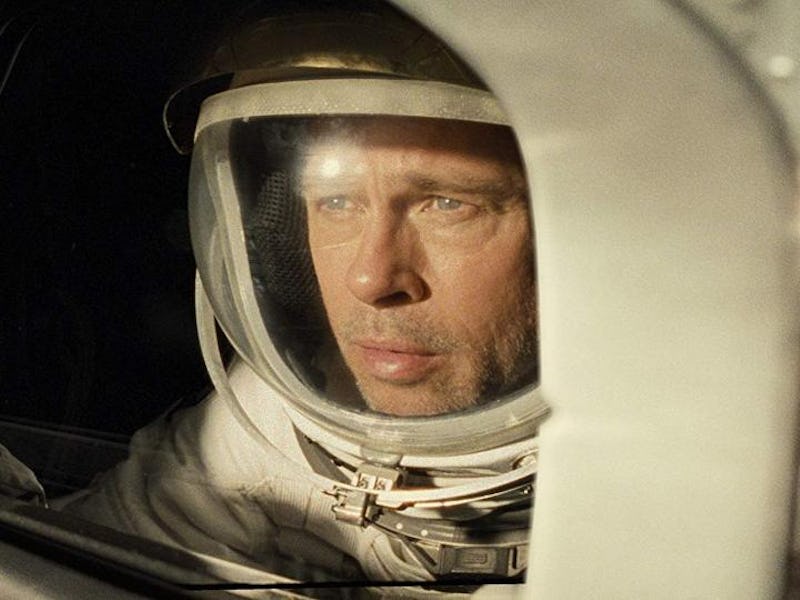'Ad Astra' space advisor doesn’t want to see an Applebee’s on the moon
The former NASA astronaut is more hopeful about future space travel.

Moon pirates, $125 for a blanket on a commercial flight to the moon, and restaurant franchises popping up on the lunar surface — those were some of the predictions incorporated in James Gray’s science fiction drama Ad Astra.
Aside from taking viewers on a daunting mission through deep space, the newly released film paints a bleak picture of where we may be headed in the uncharted territories of the cosmos.
The movie’s advisor on all things related to space travel is more hopeful about humankind’s future decisions, though.
Retired NASA astronaut-turned-consultant for private aerospace company SpaceX, Garrett Reisman tells Inverse what it was like teaching actor Brad Pitt how to fly a spacecraft and pretend he’s in space.
“We aren’t that commercial in the way you see in the movie,” Reisman says of his science-focused work.
He also admits that the vision of commercial space travel as depicted in Ad Astra is not exactly the future he would like to see.
When asked whether this is where we’re headed, he laughs and says, “I hope not, I saw the Applebee’s on the moon.”
Ad Astra's depiction of a future colony on the moon.
In the past couple of years, we have gotten closer to commercial space travel and the possibility of inhabiting other worlds than ever before. And the film is one of the first to explore that in a realistic, toned-down approach. But what it lacks in extraterrestrial drama, it makes up for in interplanetary gloominess.
Set in the not-so-distant future, Ad Astra warns of what would happen if humanity packed in a strong dose of capitalism on its way to colonize outer space. The movie follows astronaut Roy McBride (Pitt) as he journeys into the depths of space to reach out to his father, whom he thought had died during an ill-fated mission to Neptune. On his way to Neptune, McBride gets on a commercial flight to the moon, fends off pirates fighting over lunar resources, and lands on a dystopian Mars that’s divided up in different colonies.
It all seems a little too real, as venture capitalists continue to pour their billions into investments in commercial space travel.
Reisman, however, suspects that rather than becoming a future cosmic tourist trap, space travel will evolve the same way air travel has. When it was first introduced, air travel was quite exclusive, reserved only for the movie stars and elites. But today, booking a commercial flight is no longer that special.
“That will happen someday in space too, it will be a sign of progress,” Reisman says. “[Space travel] is going to be more mundane.”
Brad Pitt in 'Ad Astra'.
Reisman joined NASA in 1998 and was part of the International Space Station crew for a total of 95 days in space. He left the agency in 2011 and joined the commercial side of spaceflight as part of Elon Musk’s SpaceX.
“In some ways it’s very different, and in other ways it’s pretty much the same,” Reisman says of working for both NASA and SpaceX.
And while the same physics and technology apply to both sectors of space travel, and oftentimes the two entities collaborate on partnerships, decision making is a lot faster and more agile on the private side.
But it’s those public-private interactions that contribute to Reisman’s hopeful outlook on the future of space travel.
“All the private-public partnerships, all these other companies and people getting involved and interested in space, that’s really heartening to me,” he says.
If anything, Reisman is looking forward to the future additions to spacecrafts. The space engineer had his eye on the spaceship that McBride was piloting on his quest to Neptune, which he describes as “really neat” and hopes to get to fly one day.
For now, though, Reisman did teach Pitt how to fly a spaceship, which he says was an easy task since Pitt already has experience as a pilot. “The coolest day for me on this project,” Reisman says, was when he imparted Pitt with his wisdom. “We sat in the cockpit…he looked very natural.”
Aside from lending his space engineer experience, Reisman also contributed his expertise dealing with interpersonal issues in space.
“Two things I mentioned while talking to Gray,” Reisman says. “During a long duration expedition, the worst things to have are ego and incompetence…two things that would break apart crew cohesion.”
And of course, these factors make an appearance in the movie.